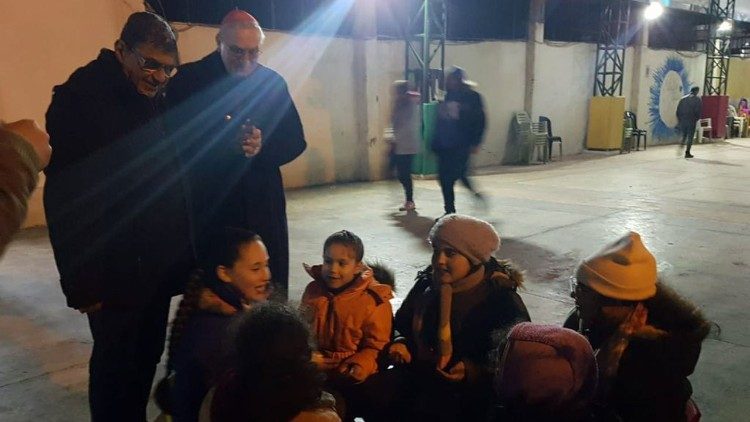 |
By Salvatore Cernuzio You see the fear of the survivors, scenes of death and devastation and sanctions blocking aid relief. Then, you have the desperate cry of people asking: "After the bombs, why this?". Cardinal Mario Zenari, the Apostolic Nuncio to Syria, arrived on Tuesday morning in Aleppo, one of cities hit by the earthquake that devastated entire areas of northern Syria and south-eastern Turkey. “(I travelled) 400 km (from Damascus) by car and I arrived late…”, he told Vatican News, which managed to contact him on a mobile phone. The line was unstable. “Normally it takes about 3 hours, it was a lot more because the road is covered in snow, it's very cold. I also had to slow down because I had a 'bomb' in the trunk, i.e. barrels of petrol which is difficult to find here", he explained. Your Eminence what did you see when you arrived in Aleppo? Zenari: As I entered the city I saw the great mosque with its four minarets down on the ground. Then the Church of the Franciscans, and there too the cornices had fallen, walls are cracked and so on. I have met people outside their homes who told me that many have taken shelter in our religious facilities. They live, sleep and eat in Christian and Catholic communities. Some have up to 500 people... You can really feel the fear of peole, they are shocked by the earthquake and adamant about not wanting to go back to their homes which are already damaged by the war. They aren’t at all safe, there is the risk that they could collapse at any moment. What scene or story struck you the most? Zenari: I spoke to a bishop emeritus who miraculously survived. He lived in an apartment and had a secretary with him, a priest of about 50 years of age. The part where the bishop lived remained standing, while the other collapsed. I saw the rubble with my own eyes, the priest died under it... (These buildings) are insecure, they have been already damaged by years of war. What does the tragedy of the earthquake mean now for the Syrians? Zenari: As everyone knows, Aleppo is considered a "martyr city". I still remember December 2016: it was snowing heavily, like now, and thousands of people had to flee the fighting. Now these same people ask themselves: "Why did this have happen to us too?". It is also priests and religious who ask this question: "We have been under bombs, there were rebels, now where does this catastrophe come from?". These are questions that are difficult to answer… Besides, all of Syria was already under what I call "another bomb", the bomb of poverty. 90% of the population, according to United Nations statistics, lives below the poverty line. So, we first had the real bombs, then all sorts of weapons, poverty, now this big earthquake… Added to this is a tragedy within a tragedy; that of the sanctions which, according to local witnesses, block the passage of aid … I do hope that there is some common sense and humanity. First of all at the national level: unfortunately, the war is not over, but I would like conflicts and animosities to be put aside and these poor people looked at with a sense of humanity. Then at the international level: what is needed is clear and it is urgent to help these people in need, beyond political divisions. This will be a test of humanity for the international community and inside Syria. What can the Church do now? Zenari: The Church in Syria was already involved in humanitarian work. Last year the Catholic Church held a conference on "Church, House of Charity - Synodality and Coordination". A couple of months ago, the Assembly of Catholic Bishops set up an episcopal commission for a more coordinated work. So we work at full speed in this sector and try to acquire more experience and professional competence. Above all, work is being carried out to ensure that these five loaves and two fish are distributed equally in the best possible way. How long will he stay in Aleppo? Until Thursday (February 9, ed). I have to visit places and communities, plus, as I said, we have to coordinate aid. There is a lot of solidarity, but it must be managed with the heart and with professional competence.
|
Views:6281

 Language
Language 

